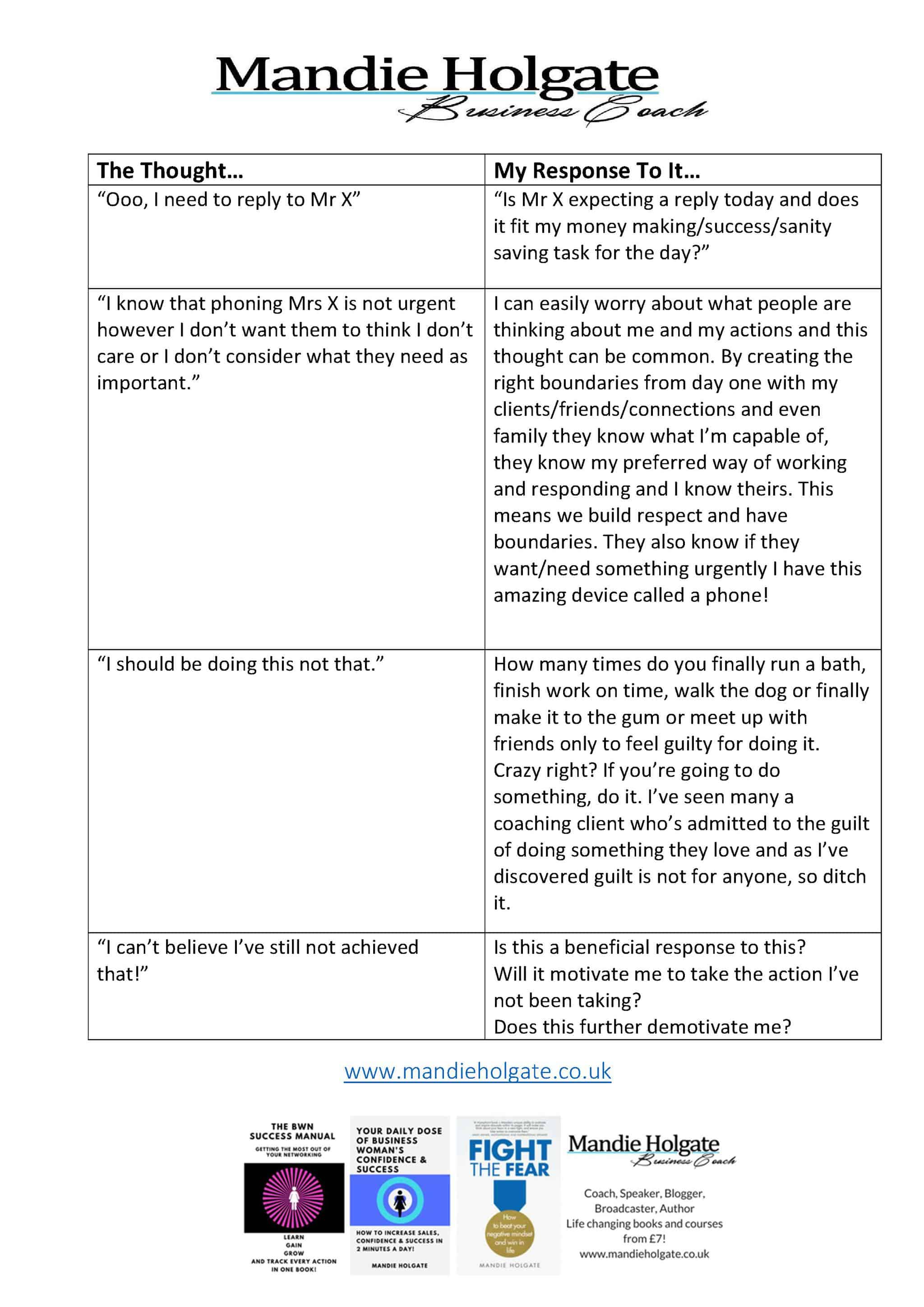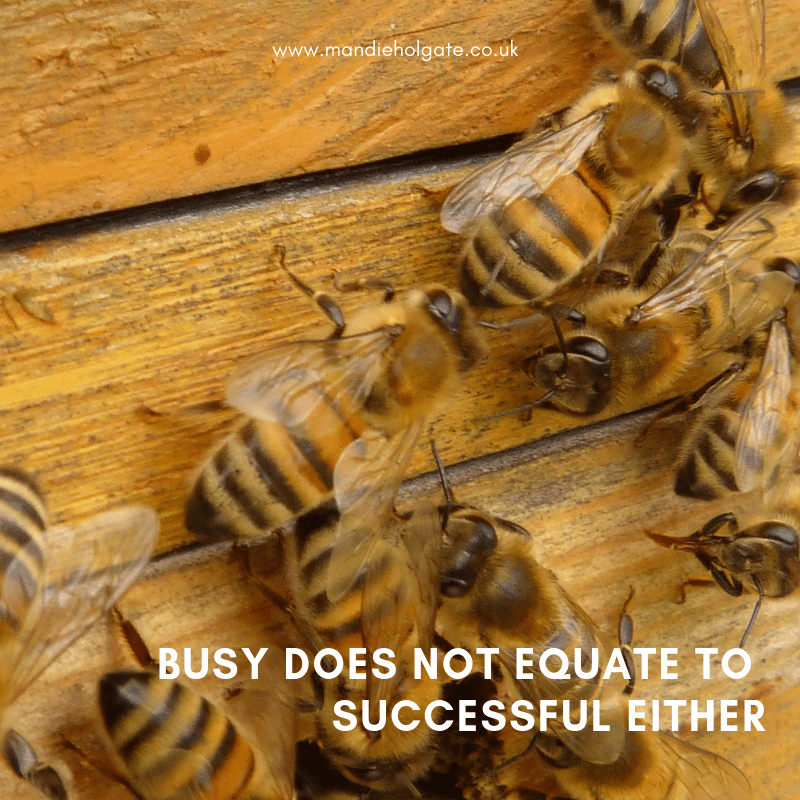My Auntie Winn could think about 30 conversations at the same time and expect you to jump from discussing world politics to the qualities of a good rock cake in less time than it took to the boil the kettle. Apparently, I do that to my husband too, I can often hear him saying “I know you think we’ve had this conversation today, however I’ve a feeling you’re giving me an answer to a conversation we had last Thursday in the hot tub!” So, racing thoughts and me are best friends, or are we? I realized that while I can be thinking a thousand thoughts at once, I don’t suffer from overwhelm, how is that? How to stop racing thoughts? In this article, I want to share how I silence my mind, create some space and why it’s so good to do personally and professionally.
Does Everyone Have Racing Thoughts?
Before I share these ideas, I want to share something that really shocked me. I decided to ask my social media friends if they “suffered” from a racing mind as so many of my clients do. The response was a little alarming:
100% of respondents said they felt overwhelmed with many saying they felt like their mind was crazy and “Switching off? What’s that!” From my over busy friends’ minds, it seems that it doesn’t just impact on your mind, it also impacts on your actions, what you get done in a day and even your ability to get a decent nights sleep! It really is time to get that mind to let up and give you some time isn’t it! So how can we fix this? Here I’m going to share a few tools to help you put the brakes on, calm your mind and achieve more without letting any of the important thoughts slip through your head.
How to Stop Racing Thoughts In Your Mind
1. Listen to your mind – Think like a pro
I realized that one of the skills I’ve learned since I became ill with Lupus is that, I’ve learned to think in the most powerful way possible. Every thought is processed. I’ve been using this practice for so many years and I appreciate that I don’t consciously do this anymore. However, at the start, you will have to structure your thinking. When I say processed, I mean I am aware of the nature of my thoughts. For instance:
I could go on, however do you get the idea? Listen to what your head has to say and then process it. If you don’t take the time to learn to do this, then ask yourself what impact this could have on your brain space, actions and results?
2. Calm the mind
When you’ve learned to actually listen to all that chatter in your head, it’s time to calm the mind. Listening does not automatically equate to it all magically disappearing. And calming the mind doesn’t require a tropical paradise, a massage and the sounds of nature to achieve a bit of brain space. For some clients, they’ve discovered the fastest way to shut their brains up is to crank up the music, so they literally can’t hear anything except their favourite song. For others, 5 minutes in the garden is enough to make them rethink. I wouldn’t say there’s only one thing that takes you to a calm place, I’d have at least 12 physical things you can do to calm your mind down. That way, whether you have a hyper mind with excitement, anger, too much going on or feeling completely overwhelmed by life, you have different ideas to work.
3. The Hi, Welcome, Good morning Game
For me, sometimes a walk under the big oak trees is enough; other times, I just find myself getting even more flustered as the thoughts fight for my attention. On those occasions I found this really simple exercise quietens my mind and makes me smile: It’s so simple and yet works every time for me. All I do is visualize 10 people that I’ve met that week and visualize the first word I said to them. I’ve usually said something like “Great to see you” or “Hello” or “Welcome to my event!” I love meeting people and I host many different kinds of events, so people are pleased to see me and we are looking forward to our time together. What a great set of emotions and feelings to recreate in my head. How could you use my welcome exercise to remind you of something in your week that makes you feel good? (This also works on ear worms too!)
4. Focus the mind
When a coaching client arrives, they tend to start our session by talking so fast that I’m not sure even they can hear half of what they’re saying! After about 20 minutes, they are out of breath like they’ve been for a run, and their shoulders seem a little lighter as they’ve dumped the contents of their head on to me. What is happening when a client does this is they are:
Becoming more aware of what is going on in their head. Sometimes actually hearing the truth for the first time themselves! Putting everything in front of them metaphorically so they can work out what to work on and what to dump. I call it ditch it or deal with it. And it works wonders on “To do” lists too! Noticing how everything in their head impacts on them — physically and emotionally. Challenging the beliefs they are holding around their perception of reality.
And that’s just for starters! Read on for the next step.
5. Create a plan of action
Once you can see what is going on, you can create a plan of action that moves you forward. Focus means “the main or central point of something, especially of attention or interest” and this is what you need to calm an overwhelmed head of racing thoughts. While you may not have a coach to work with, create some ways to empty everything out of your head and focus on what you need/want to do. These could include:
Arrange to meet with a friend or colleague and agree that “without judgement” they will listen and not interrupt. Agree that you will donate an hour to enable them to do the same. One Facebook friend told me that their “cure to a racing mind” was to “disappear to bed with a pen and notebook to write it all down.” While in theory that is a good idea, I asked them if this worked for them, and they said sometimes. Could that be because they’ve waited until bedtime to process everything and get it out, instead of dealing with it when it was really a problem? Journaling can store up a lot of negative emotion if we keep reading it, so pay attention to how your notes make you feel. Is it really beneficial to you or do you need to change the way you write? Make the time to focus. Do you need to put it in the diary or will you natural make the time to do this? Create a list of all the things you could do for all the things you have whirling around in your head. Make it a long list. Dismiss nothing. Play the ditch it or deal with it game. So often what we think we should be stressing about is actually someone else’s definition of important, therefore ask yourself “does this really matter to me?
6. Less on your to do list
Years ago, people would answer “How are you?” with “I’m fine, thanks” or “I’ve had a bad cold but I’m getting better now, thanks!” However today’s reply is far more likely to be “Busy, how are you?” Busy is not an emotion or feeling!
Many of us have a busy mind because we are so busy. More and more I’m being asked to help professionals and organization to create coach-able strategies to manage their time. Here’s a few of those ideas to help you with your racing mind: We often over think how long a task that we hate doing is going to take and so put it off and thus it gets to stick around in your head! Set a timer and know how long a task takes. Many clients have been able to clear a whole task from their head because their perception of its impact on their day and productivity has been changed. Contrary to the first top tip, we also underestimate how long other things take to do. If you know a job will take an hour, allow 1.5 hours. This means if it doesn’t take that long, you’ve just made some brain space for yourself too, so it’s a win win situation. Have you ever noticed how many sayings we have around words related to time? I really want some Me time. I never have the time. I know you’ve got a lot on, but make the time. I don’t want to spend my time telling you what to do, etc, etc. Ask yourself if your choice of words free up your mind or make it even busier? We all have alarms and reminders that ping up at us. Even our household appliance now bleeps at us saying “Hey, I’m ready, give me your attention!” Turn them off. If you know you have a lot on, choose what you can hear carefully. Just like the person turning the music up so they can’t hear their own thoughts. Our ability to process what is going on in our heads can be impacted on by the email ping or the notification sounds. I have seen presentations where we’ve been told the best course of action is Eisenhower’s matrix for time management, which asks you to place every task (or thought) into a grid. The blocks are labelled: Urgent, less urgent, important and less important. While I’ve seen clients create their own version of this to great success. I also seen new clients who have told me that it takes them hours to complete the grid and so they get no work done and end up with even more flying around inside their heads! That’s enough to drive anyone insane! What works for one person does not mean it will work for you. You could try relabelling Eisenhower matrix as my clients to make it personal to you, to encourage you to use it. Alternatively, there is an app for everything. What about finding an app that enables you to empty your head. I love Wunderlist for enabling me to create some space in my head. In this way, you can put to one side thoughts while you concentrate on what is important right now.
7. Ditch that guilt
And lastly, if you have a brain that is running away with you, ditch the guilt because I wouldn’t mind betting you’ll free up a lot of space with that 1 action! Guilt is one of those emotions that causes us to process things again and again and again. Look for the guilt in your thoughts, analyze why it exists and get rid of it.
Final Thoughts
It’s totally normal if you find your thoughts racing in your mind all the time. What you need to do is to really listen to your thoughts and take some concrete actions about those thoughts. Forcing yourself to silence those thoughts is not the most efficient way in the long-run. Time to face these thoughts and find what works best for you to deal with these racing thoughts. Featured photo credit: Priscilla Du Preez via unsplash.com



